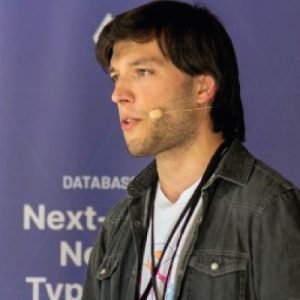
Schedule
Your success is ours! This is our business model!
Small Sessions
Our conference includes small sessions of 30min each, delivered by speakers from all over the world. In order to ease the participation from all over the world we chose to start the conference at 11:30 (GMT).

Hour
Speaker
Talk
11:30 GMT
 Martin Henz
Martin Henz
Xtreme Shrinking of JS for Teaching
This talk describes how to teach computational thinking and programming using the JavaScript adaptation of the classic textbook “Structure and Interpretation of Computer Programs” (SICP JS). In teaching and learning programming at first-year-university level, simple languages are preferable over complex industry-strength languages, because simple languages reduce the learners’ cognitive load and let educators focus on what is important: the mental models of computation. Rather than using full JavaScript, we developed “Source”, a collection of tiny JavaScript sublanguages that are just expressive enough to introduce first-year computer science students to the elements of computation. Source is supported by a web-based programming environment “Source Academy”, which provides transpiler-, interpreter-, virtual-machine- and algebraic-stepper-based implementations of the languages, and includes tracing, debugging, visualization, and smart-editor features. You will get a taste of SICP JS, Source, and our course, and a good idea of the look-and-feel of Source Academy and its implementation.
12:00 GMT
 Ansab Gillani
Ansab Gillani
Building Microfrontend Architecture for scale with JS
Armed with the knowledge of JS development, we delve deeper into the different types of microservices and the high-level design principles we should follow when we design them.
12:30 GMT
 Christopher Miller
Christopher Miller
Clean, Concise, and Collaborative Code
Together, we will look at some questions that you can ask about your code to ensure that everyone – you, colleagues, customers, and your future self – can benefit from well written, clean, concise, collaborative code, no matter what your experience level, your choice of language, or the size of the team.
13:00 GMT
 Nitin Jain
Nitin Jain
Microfrontend Architecture using Plain JavaScript
Similar to Microservice, we now have a Micro-frontend design solution to overcome monolithic design challenges. There are many JS-based sugar-coated libraries that are implementing Microfrontend by hiding the complexity from developers. This is great, but at the same time, we are hiding the extreme possibilities one can do using this approach by abstracting the low-level details. In this talk, Nitin will show a small application built using vanilla JS and webpack to implement the concept of Microfrontend.
13:30 GMT
Lunch Break
Lunch Break
14:00 GMT
 Katarzyna Wojdalska
Katarzyna Wojdalska
Digital Ecology: Can you Mitigate The Carbon Footprint of Websites?
Did you know that more than 250,000 websites are published every day? The majority use away too heavy fonts, too large and/or unnecessary images and/or utilize redundant libraries. These and other factors generate the carbon footprint. Actually, one view of an average website emits 1.8 g CO2 which sums up to 216 kg CO2 annually. Unfortunately, current solutions optimize only existing websites only.
14:30 GMT
 Asaf Shochet
Asaf Shochet
My Accessibility Journey: The Quest for an Accessible Components Library
Creating web applications can be challenging. Creating accessible ones – even more. However, the real challenge lies in maintaining accessibility in your project since it requires knowledge and skills beyond traditional web development. To make this happen, one must choose the proper tools to keep the accessibility level high when code gets refactored, monitor the accessibility status, and test it automatically during CI. To tackle these challenges, I’ll introduce a different approach that intertwines accessibility into the gut of the web application by creating an accessible React components library. I’ll discuss the principles, tools, and techniques I use to test and maintain the accessibility level over time and provide you with the initial recipe to drive the accessibility change in your organization.
15:00 GMT
 Krishna Lodha
Krishna Lodha
OpenLayers: The Open Source Option of Adding Maps on Websites
Location data is a critical factor in nearly every business. As developers, we need to be familiar with the possibilities. This talk will familiarize us with various ways to visualize geolocation data on websites. We will show how to use multiple open-source technologies, such as the OpenLayers library.
15:30 GMT
 Ishan Sharma
Ishan Sharma
Web Animations: Past, Present & Future
In this talk, we’ll take a deep dive into web animations. Firstly, We will look at the history of web animation starting from SMIL, its evolution and transformations, the different types of animations available today CSS, JS or CSS + JS + Third party libraries, how to choose a suitable type for your requirements, while keeping it performant. Of course, we’ll close it with a brief walkthrough of the new good stuff such as Page Transitions coming in the Web Animations API.
16:00 GMT
Second Break
Small Break
16:30 GMT
 Alberto Schiabel
Alberto Schiabel
Write a Scraper as a State Machine with Playwright and Kafka
Designing a scraper is a daunting task, yet a useful one. Often, scraping is the most viable way of programmatically retrieving data when no public API is accessible. In this talk, we’ll design a loosely coordinated system of microservices that scrape information from Glassdoor. You’ll learn how to start from a high-level state machine design to then dive deep into the implementation with Playwright, where we’ll discuss its capabilities and gotchas. Finally, we’ll see a demo of the open-source implementation, written using TypeScript and Kafka.js.
17:00 GMT
 Adam Niederer
Adam Niederer
Centralizing the Frontend with Design Systems & Web Components
Learn how to improve developer efficiency and consistency of user experiences in a large organization with a design system and how to implement and manage one at scale using web components and micro frontends. Includes discussion of the costs and benefits of hosting and deployment models and how to mitigate issues arising from being an organization’s most-used internal dependency.
17:30 GMT
 John Lindquist
John Lindquist
Script Kit: The Ultimate Open-Source Dev Kit
Script Kit is a powerful combination of the Kit SDK and the Kit App: 1. Kit SDK – A JavaScript library that helps you quickly author workflows for everyday tasks 2. Kit App – A mac/windows/Linux application that runs, edits, and shares scripts Using these two tools together as Script Kit, you can create powerful workflows that can be shared with your team and the world in a matter of seconds. The scripts can then be run with keyboard shortcuts, on a schedule, from other apps, or in many different ways. From connecting to AIs, taking notes, downloading files, manipulating images, creating widgets, and much more, anything is possible! This presentation will cover the basics of Script Kit by creating workflows that you can take with you and customize to your needs.
18:00 GMT
 Gil Fink
Gil Fink
Make it Resumable with Qwik
Web development is changing all the time. We moved from DOM manipulation libraries to MV* frameworks, and today we are using component-driven frameworks. But what if the frameworks are getting in our way of achieving better performance? This is where resumability can make a difference. In this talk you will get to know Qwik, a resumability framework, and then you will learn how to use it to build better performant apps.
18:30 GMT
Third Break
Small Break
19:00 GMT
 Gavin Uhma
Gavin Uhma
Protecting Sensitive Data in Web Apps
Developers have a responsibility to their users to protect data. Gavin will show you easy ways to encrypt data and process it securely in order to keep it confidential. We’ll walk through the messy and often insecure journey that data takes from the moment of collection, over networks and into storage. And we’ll design and build a web app with a modern, secure architecture based on end-to-end encryption and confidential computing.
19:30 GMT
 Griffin Solot-Kehl
Griffin Solot-Kehl
Building a Browser-Based Metaverse App with Babylon.js
This talk is about how we can build immersive 3D environments in JavaScript. We will see how we can build an interactive world in Babylon.js and demo it working in real time. This talk will cover the following topics:
– Real-time audio
– Live streaming media
– Increased engagement and retention of users
– Broadcast quality workflows with low latency
20:00 GMT
Test Effective Development – End 2 (What) End?
That was me… screaming at the computer screen, when my test suite ran for several minutes… just to find out that 50 tests just broke! All the time saving I thought I’d get from not having to chase down bugs was replaced with time wasted on constantly fixing broken (and slow) tests. Developers want to sleep tight knowing they didn’t break production. Companies want to be efficient in order to meet their customer needs faster and to gain competitive advantage sooner. We ALL want to be cost effective! But how do we do that? In this talk I’ll share the no. 1 strategy developers can apply when writing “End 2 End” tests to gain maximum confidence without wasting their time on inefficient tests. Excited? My mom is excited as well…
Your Success is Ours!
We will do our best to serve your needs! This is our business model!


